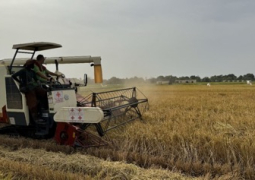
AMR is a serious threat caused by the misuse of drugs like antibiotics, leading to drug-resistant infections that are harder to treat.
Welcoming the gathering, Njudou Jatta, National AMR Focal Person, who is also Principal Clinical Pharmacist at the National Pharmaceutical Services at the Ministry, expressed delight to be associated with the event, which he said, is geared towards increasing awareness on the growing threat of antimicrobial resistance.
“Over the years Antimicrobial Resistance is seen as a threat that is coming, but that is no more, because the threat is already here. People are dying in millions annually with Antimicrobial Resistance.”
He described AMR as something that not only health workers see as a concern, but something of a great concern for everyone.
“It is a condition that is affecting almost every part of our lives, and if animals are affected with resistant bacteria and it kills them, then it affects our food safety, and eventually our economy is going to be impacted.”
Also speaking, Momodou Barrow, Emergency Preparedness and Response Officer at the World Health Orgainsation Country Office, gave a statistical overview of the impact of the condition, acknowledging that globally, AMR is responsible for at least 1.27 million deaths annually, and associated with nearly 5 million deaths every year.
“If no action is taken, projections showed AMR could cause 10 million deaths annually by 2050. In Africa, the burden is even heavier.”
He revealed that over 1.5 million deaths are associated with AMR surpassing deaths from HIV, AIDS and malaria combined, noting that this menace poses serious threat and public health concern.
This crisis, he observed, is driven by the misuse and overuse of antibiotics in humans, animals and agriculture.
Haruna Jallow, principal lab scientist at the Ministry of Health and Baba Fofana, from the Edward Francis Small Teaching Hospital, and both members of AMR Surveillance Team, expressed similar sentiments.
Dr. Ousman Ceesay, Deputy Director General Animal Health Department of Livestock Services Abuko, said that the phenomenon of AMR is very real and that it is a Gambian problem.
The problem, he added, threatens the very core of ‘our existence’ and that our resilience and food and security,’ so when we talk about animals, it is also under question.’
Rohey Njie, Deputy Director of Health Promotion and Education at the Ministry, while extending appreciation to their partners for their support, highlighted the importance of this year’s theme of the event.
She talked about their numerous initiatives at hand to raise awareness about AMR.
Bakary Sanneh, deputy director National Public Health Laboratories at the Ministry of Health, spoke about the importance of the awareness week, reminding that AMR used to be a distance phenomenon, but that it is now so proximate.
He also spoke about their stewardship survey, which he said, has helped them to understand the dynamics of what is causing infection and what are the susceptibility patterns.
Sanneh also called for the need for more stringent measures against substandard drugs, citing the MCA Bill for Regulation.





